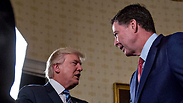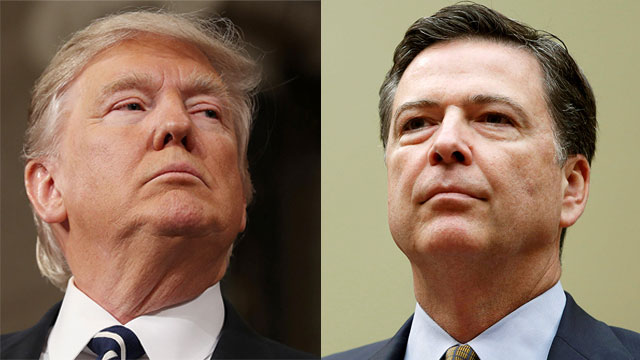

Trump not expected to invoke executive privilege to block Comey testimony
With former FBI director Comey due to speak before the Senate on US Pres. Trump allegedly pressuring him to drop investigation into suspected Russian ties to his campaign, experts estimate whether Trump will use executive order to stop him from testifying; While chances of Trump doing so or convincing Congress that such an order is valid are slim, some say that even attempting this 'makes it look like you have something to hide.'
Comey is expected to tell the Senate Intelligence Committee that US President Donald Trump asked him to drop an investigation into former White House national security adviser Michael Flynn's ties to Russia. Trump fired Comey on May 9.
Legal experts say that Trump could invoke a doctrine called executive privilege to try to stop Comey from testifying. But such a maneuver would draw a backlash and could be challenged in court, they said.
The following describes how executive privilege works and why it could backfire on Trump if he invokes it.
A presidential gag order
An executive privilege is a legal doctrine that allows the president to withhold information from other government branches.The US Supreme Court ruled in 1974 in US v Nixon that executive privilege can only be used in limited circumstances, such as protecting national security or preserving the confidentiality of sensitive communications within the executive branch.
Before invoking executive privilege, the president typically obtains a written memorandum justifying the decision from the Office of Legal Counsel, a division of the Department of Justice. The White House counsel is often informally involved in the decision.
After invoking the privilege, the president can direct current and former government officials to not divulge information.
A precedence of executive orders
According to Mark Rozell, a professor of government at George Mason University, the term "executive order" was not coined until the 1950, though most presidents have invoked some version of it. President Barack Obama asserted the privilege in 2012 to block Congress from seeing documents relating to an investigation into Fast and Furious, a botched gunrunning operation conducted by the Bureau of Alcohol, Tobacco, Firearms and Explosives.
High stakes with a low chance of getting the order passed
Legal experts said Trump would face an uphill climb if he asserted executive privilege to stop Comey from testifying before the congressional committee.Trump likely would argue that Comey's testimony involves confidential conversations or matters of national security. But that claim would be undercut by the fact that the president has publicly discussed and tweeted about his conversations with Comey, said Rozell.
Trump faces another hurdle if he tries to block Comey's testimony. If Trump pressured Comey to drop the Flynn investigation, as Comey is expected to testify, then Trump may have engaged in obstruction of justice, according to some lawyers. Executive privilege cannot be used to "cover up government misconduct," said Andrew Wright, a professor at Savannah Law School.
Typically, a president uses executive privilege to prevent government employees from releasing information. Comey is now a private citizen who does not have to worry about losing his job if he does not comply. Rozell said he knows of no legal sanction for ignoring an assertion of executive privilege, but that it would be "unprecedented" for an assertion of the privilege to be ignored.
Preferring a compromise over a battle of wills
The president and Congress usually hammer out a compromise when they disagree about whether privilege can be asserted, said Rozell.
But there are instances of executive privilege being challenged in court. When Obama cited the privilege to block the release of documents relating to Fast and Furious, Congress sued and asked a judge to direct then-Attorney General Eric Holder to comply with its subpoena. A judge ruled last year that the Justice Department's public disclosures about the controversy undercut the president's executive privilege claim, saying that the Justice Department had already publicly revealed much of the information it said should be kept private.
It would be procedurally complicated to challenge a decision by Trump to block Comey's testimony. First, Congress would have to issue a subpoena requiring Comey to testify. Then Congress would have to find Comey in contempt if he refused. Congress could then ask a federal judge to force Comey to comply with its subpoena. That litigation would lead to a ruling on whether Trump lawfully invoked executive privilege. "There is a path to judicial review, but a lot of things would have to take place," Wright said.
Trump would surely face public criticism if he tries to stop Comey's testimony, Rozell said. Critics could claim Trump is using privilege to thwart questions about potential ties between Russia and Flynn and Russia's alleged influence on the election.
A diversion from Russia, with love
In the past 24 hours, the investigation into the contacts between Trump and Russians has been reported to continue to expand, with FBI special counsel Robert Mueller naming former Trump election chief Paul Manafort and possibly Attorney General Jeff Sessions to be included in the criminal investigation.
In the meantime, Russian President Vladimir Putin continues to argue that his country did not intervene in the 2016 US presidential elections. "Hackers can be anywhere," said Putin during an interview with Megyn Kelly. "They can be in Russia, in Asia, even in America, Latin America. They can even be hackers, by the way, be in the United States."
Putin hinted at a deliberate American action designed to blame Russia. "They very skillfully and professionally shifted the blame, as we say, onto Russia. Can you imagine something like that? In the midst of a political battle. By some calculation, it was convenient for them to release this information. So they released it, citing Russia. Can you imagine something like that? I can," accused the Russian president.
Despite everyone's best guesses, whether Trump will attempt to use his power to stop Comey from testifying remains unclear. While his defenders in Washington claim he did not say or do a word to Comey that he is looking to keep private, Rozell notes, "That's the rub with executive privilege: It makes it look like you have something to hide."
















